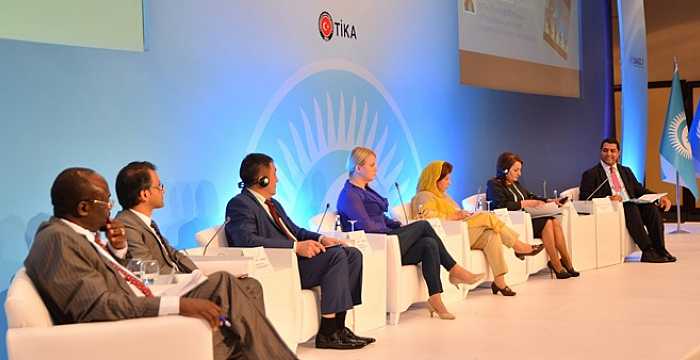Within the framework of the conference “The role of Youth in preventing and countering violent extremism” the discussions under the theme “Working on Innovative Methods for De-radicalization and Rehabilitation of Youngsters Involved in the Violent Extremist Acts” was held on 21 October 2016. The Panelists were: Prof. Peter Kagwanja from Africa Policy Institute, Kenya; Alim Shaumetov, from the Center of Information, Propaganda and Rehabilitation Akniet, Kazakhstan; Velma Saric from the Post-Conflict Research Center, Bosnia-Herzegovina; Mossarat Qadeem, from PAIMAN Alumni Trust, Pakistan; Almaz Hasanova, from the Ministry of Internal Affairs, Azerbaijan and Zeeshan Amin Political Affairs Officer at the UN Counter-Terrorism Implementation Task Force (CTITF) Office. Mr. Bilal Erdogan, President of Ethno-sport confederation, was also present at the Panel as the honorary guest.
Tools and methods being used in de-radicalization and rehabilitation of youngsters involved in the violent extremist acts were among the topics for discussion. In view of the inefficiency and inadequacy of some of the existing tools, panelists argued that detailed researches should be conducted and locally established innovate solutions should be offered other affected regions.
Furthermore, the role of internet and social media in the increase of both radicalization and recruitment to terrorist organizations or activities were dis.
In the interactive session, the spreading of the successful practices was questioned and the necessity to take into account the unique circumstances of different regions was underlined.
Prof. Peter Kagwanja noted that there was still need to elaborate more on the concept of violent extremism and as a second step, to conduct research on the drivers and dynamics of the phenomenon.
Zeeshan Amin underscored some of the pillars determined for the purposes of countering violent extremism from the Secretary-General’s Plan of Action which was adopted at the beginning of the year. He explained that along with SG plan countries were also encouraged to develop their own national strategies.
Alim Shaumetov briefly explained the activities of the Center and emphasized on the importance of explaining to the already radicalized youth the misinformation that they were given on religion by the radical groups. He stated that programs and methods used in his country were successful not only for the rehabilitation of those who were already in the penitentiary but also for the de-radicalization of those in the society. As a result of their activities, Mr. Shaumetov informed, since 2015 there were not known cases of youth departure to join international terrorist networks.
Velma Saric underlined the importance of the role of social media in de-radicalization especially through the inclusion of the youth. As an example, she talked about the `youth citizenship project` where young people could spread the successful examples of rehabilitation. She also pointed to the significance of `youth driven` research on the violent extremism.
Mossarat Qadeem elaborated on the activities of her center and highlighted the importance to work with communities, more specifically with the mothers in preventing the young people before falling prey to the violent extremism. She explained that extremist ideology existed even among teachers in schools, therefore it was important to make sure that students and teachers get proper education and training.
Almaz Hasanova, briefed the audience on the Nagorno-Karabakh conflict.
Developing counter-arguments, closing the gap between the governments and civil society in PVE efforts, proper conceptualization of PVE and relevant research on the phenomenon, and the inclusion of the youth in creating narratives were the suggestions made during the discussions.








